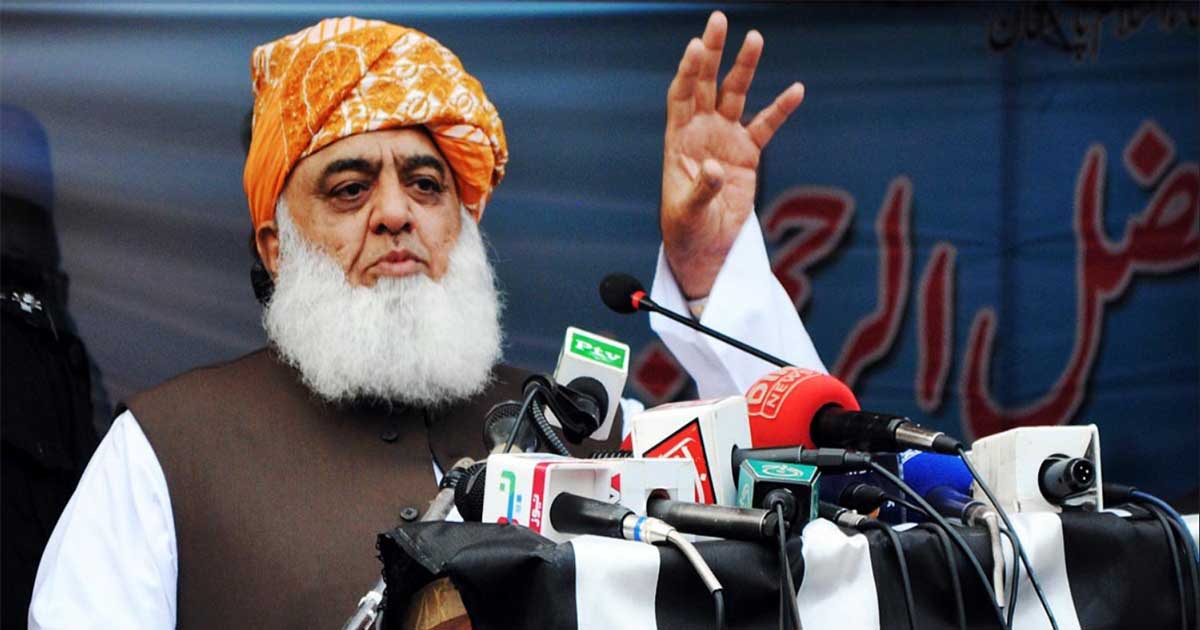Jamiat Ulema-e-Islam-Fazl (JUI-F) chief Maulana Fazlur Rehman, who apparently failed to get anything ‘substantial’ for his face-saving, said on Thursday that Pakistan Tehreek-e-Insaf (PTI) asked him to call off his Azadi March in return for the post of Senate chairman. The claim could not be verified but sources claim that no such offer was made to Maulana.
However, JUI-F’s chief maintains that he was offered a good place. “You don’t know what offers they made me,” he said, referring to the government. “I was told to leave my seat and I could get re-elected to the assembly from Dera Ismail Khan,” he claimed.
“I want to tell the world that we want to move on a tougher front. Our #protest will get even harder, the pressure will increase,” #JUIF chief, #MaulanaFazlurRehman told Arab News in an exclusive interview pic.twitter.com/j8a63lsR3X
— Arab News Pakistan (@arabnewspk) November 13, 2019
He claimed that the government attempted to buy him off by offering him to form a government in Balochistan. “I was also offered the post of Senate chairman,” he claimed. “I thought all the offers being made to me were belittling.”
Maulana who maintains that the protest shall become even harder was not politically relevant after losing his home-constituency during the general elections 2018.
Federal Minister for Science and Technology, Fawad Chaudhry, believes that Maulana has been exposed since the nation stood by a democratically elected government. He spoke to a private TV channel and slammed Maulana for exaggerating the reality.
Read more: Fazal Ur Rehman- Fighting for Islam or Islamabad?
Professor G.M Pitafi who teaches Politics and International Relations at the University of Management and Technology, Lahore believes that Maulana came to lockdown Islamabad to increase his political capital. “In my opinion, Maulana lost almost everything since he is not part of the present set-up.
Therefore, he behaved like now or never, and fought for his political survival,” he said. Mr. Pitafi also believes that the government is in a better position so there are slim chances of offering anything substantial to Maulana.
13-days Dharna
After 13-days long dharna in the federal capital, the JUI-F’s chief announced to call it off. While addressing the dharna participants from atop a purpose-built shipping container, on November 14, the politico-religious cleric announced that the protest movement set off by the ‘Azadi March’ would now spread to every nook and cranny of the country as part of ‘Plan–B’ that envisages blockade of “major arteries and highways – and even by lanes and streets”.
"مولانا فضل الرحمان شہر شہر بے عزت ہورہے ہیں۔ سڑک روکنے پر ٹرک اتر کر انہیں جوتے ماررہے ہیں۔ مولانا فضل الرحمان اپنی لُٹی پُھٹی عزت بھی گنوانے کے چکر میں ہیں۔ہم نے مولانا کے خلاف کوئی کاروائی کی ہی نہیں اگر ہم کریں گے تو۔۔"- فوادچوہدری@fawadchaudhryhttps://t.co/31vsmPjcwt
— Siasat.pk (@siasatpk) November 21, 2019
“We’ve decided that we would not stage sit-ins in cities as this would affect the lives of fellow citizens [which we don’t want]. We’ve decided that we would stage sit-ins on main roads and highways outside the main cities,” the cleric said amid vociferous sloganeering from his supporters. But it did not prove productive therefore the party had to call it off again.
Plan B called off
The opposition’s Rehbar Committee on Tuesday called off the road blockades and anti-government sit-ins being held in various parts of the country in order to “not cause inconvenience to the public”. Political commentators are convinced that Maulana Fazlur Rehman has failed to achieve anything except some political relevance.
While addressing a press conference after an hours-long meeting of the committee, JUI-F leader Akram Khan Durrani directed workers to open all blocked roads starting tonight. Instead, he announced, the opposition will hold joint Jalsas at the district level as part of its anti-government movement.
Read more: Maulana Fazal Ur Rehman, politically defeated, is now trying to topple the government?
Political commentators argue that Maulana brought students of religious seminaries to block roads and put pressure on the government. These students were representative of a particular sect who came to the federal capital because of the orders of their teachers which means it was not a political protest by the citizens.
A political protest is supposed to be a combination of various social groups that come together to demand a particular cause. It is believed that since the JUI-F was not representative of the people at large, hence, there was no pressure on the federal government.














